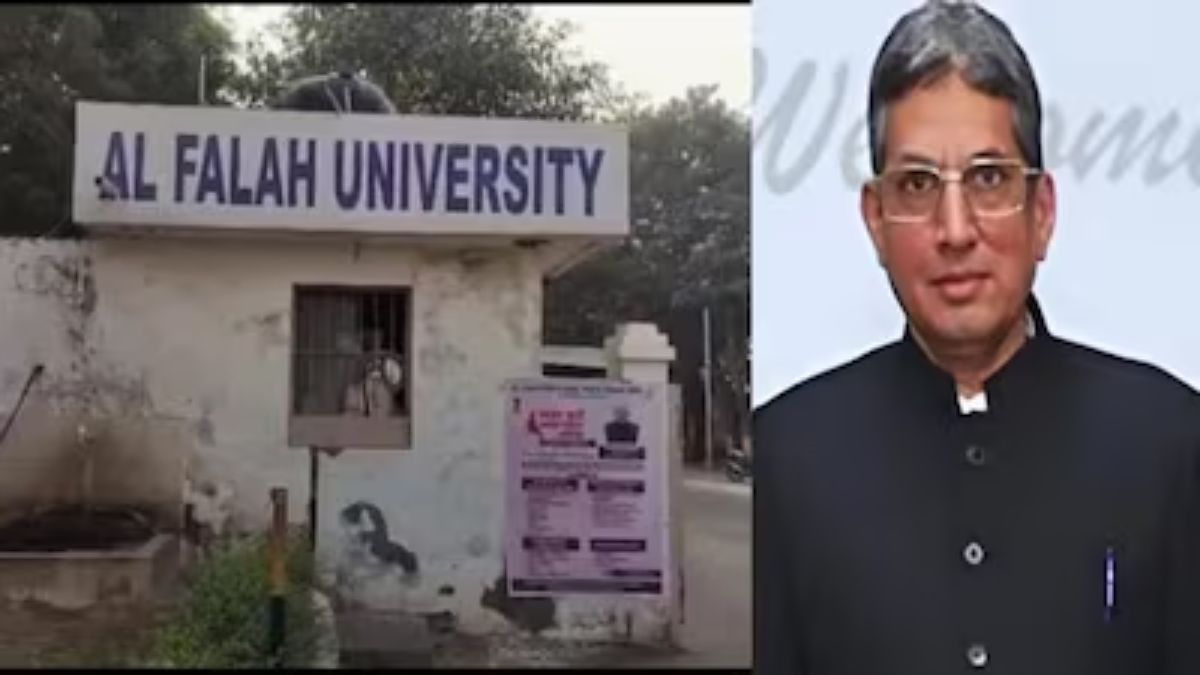Jawad Ahmad Siddiqui, the director and founding trustee of Al-Falah University, has found himself at the centre of an intense investigation after the deadly Delhi blast near Red Fort killed at least 13 people earlier this week.
The spotlight first swung his way when three doctors linked to the alleged “white-collar terror module” in Faridabad, Dr Umar Nabi , Dr Muzammil Shakeel (also known as Muzammil Ahmad Ganaie) and Shaheen Shahid , turned out to be working at Al-Falah University. That discovery pushed investigators to look more closely at the institution and the people running it.
Now, agencies are digging into Siddiqui’s older criminal cases, his company ties and whether the university had any role in a larger pattern of irregularities.
Here’s what we know so far.
Who is Jawad Siddiqui?
Jawad Siddiqui, originally from Madhya Pradesh, is an engineering graduate from Devi Ahilya Vishwavidyalaya in Indore.
According to Indore’s Additional SP Rupesh Dwivedi, Siddiqui and his family once lived in Kayasth Mohalla in Mhow, where his father, Mohammad Hamid Siddiqui, served as the Seher Qazi. “We are collecting information about his old contacts and relatives,” Dwivedi said.
A Times of India report states that Siddiqui joined Al-Falah Investments as a director on 18 September 1992. Over the years, he played a key role in shaping the Al Falah Charitable Trust, set up in 1995, which today runs the university along with several allied institutions. The main campus in Dhauj village, Faridabad, is spread across 78 acres.
Beyond the university, Siddiqui’s footprint extends across at least 15 companies involved in education, software, agribusiness and research. Within the Al-Falah group, he holds multiple senior posts, including managing director of Al-Falah Investments, chancellor of Al-Falah University since 2014, and head of several other group entities.
Meanwhile, the university has tried to distance itself from the activities of the three arrested doctors. Legal and finance officer Mohammad Razi told TOI that the institution had “no information” about what they were doing outside their professional duties. “We have many meritorious students whose education should not be affected because of this,” he said.
Also read: What conspired in Room 13 at Al-Falah University ahead of the Delhi blast?
Siddiqui’s controversial past
Siddiqui’s history has been marred with controversy.
In 2000, an FIR (No. 43/2000) was filed at Delhi’s New Friends Colony police station, accusing him and his associates of duping investors by converting their funds into forged shares and diverting the money into their own accounts. The alleged fraud was pegged at Rs 7.5 crore.
Siddiqui was arrested in 2001 and spent over three years in Tihar Jail. His bail plea was rejected by the Delhi High Court in 2003, and he was finally granted bail in February 2004 after agreeing to refund the people he had cheated.
According to NDTV, many of the complainants were from economically vulnerable Muslim families who had been encouraged to invest in so-called ‘halal’ schemes.
Al-Falah group’s companies under scanner
The government has now ordered a forensic audit of Al Falah University’s finances, while agencies such as the Enforcement Directorate (ED) have been tasked with tracing money flows linked to the trust and its companies.
Public data from the Ministry of Corporate Affairs and ZaubaCorp shows Siddiqui is associated with at least 15 companies across various sectors, including education services, software development, agribusiness, medical research, and engineering research.
Nine of these companies are currently active. The remaining entities, now inactive, were previously involved in stock trading, import-export operations, energy projects, hospital services, software publishing and even radio and television communication activities.
A cluster of these firms, seven in total, is registered at the same address: Al Falah House, 274A, Jamia Nagar, New Delhi. Another company, Tarbia Foundation, listed under “educational activities,” is registered at 274B, Murtaza Apartments, also in Jamia Nagar.
Across these companies, a familiar group of names appears repeatedly as directors: Sufyan Ahmad Siddiqui, Saood Siddiqui, Shima Siddiqui, Fardeen Beg and Mohammad Jamil Khan, along with Jawad Ahmad Siddiqui himself.
Officials at Al-Falah University’s Delhi office in Jamia Nagar told TOI that the institution has no official link to the doctors arrested in connection with the Old Delhi blast. The office operates from the ground floor of a residential building owned by the trust.
Also read: Why Al Falah University in Faridabad is under scanner after Delhi car blast
Action against Al Falah University
As the terror probe widens, the university is also facing scrutiny for its academic claims. The National Assessment and Accreditation Council (NAAC) has issued a show-cause notice accusing the institution of misleading the public about its accreditation status.
In the notice, NAAC pointed out that Al Falah University, “which is neither accredited nor applied for accreditation by NAAC,” had claimed on its website that it runs colleges graded ‘A’ by NAAC, including Al Falah School of Engineering and Technology, Brown Hill College of Engineering and Technology, and Al-Falah School of Education and Training.
NAAC has demanded an explanation and ordered the university to immediately remove all such references from its website and any other public documents.
The Association of Indian Universities (AIU) has also stepped in. It suspended the university’s membership on Thursday, saying the institution “does not appear to be in good standing.”
According to PTI, AIU also barred the university from using its name or logo, directing that the logo be removed from all official platforms.
With input from agencies
)